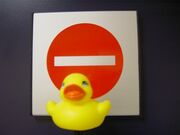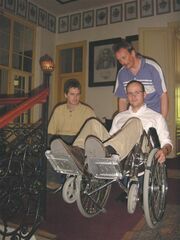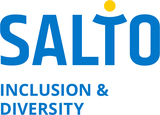Accessible Venues
- find this and more in the SALTO Inclusion for All booklet:
If certain 'exclusive criteria' are not met, some of your young people with a disability will simply not be able to come on your project (because they won't get on or off a train, or there is no adapted washing possibility, etc)
It is part of your preparation (with your partner organisation abroad) to make sure the venue where you will be staying is adapted to the needs of the people in your group. Always try to speak with a person that knows the venue well before booking it (not an intermediate booking agency) and ask specific accessibility questions (see the checklists for different disabilities). The disability sign on the website or brochure can mean different things in different countries (from having an accessible toilet only, to being fully adapted for persons with a disability - mostly this means wheelchair-users). So check more in detail whether the venue is adapted to your needs (and numbers).
It is also a good idea to check if the venue has adapted alarms and procedures for emergencies i.e. fire. Are there adapted alarms for the deaf? How will evacuation take place? You might prepare a division of tasks amongst your group in case something happens. Better safe than sorry!
Most hostels or hotels are a business like any other, so they try to sell rooms, and maybe tend to give you the answers you are looking for and make their establishment look just a little bit better than it really is. Therefore it could be good to ask open questions instead of questions which only require yes-no answers and to which they would too easily be able to give an evasive 'yeah yeah' answer, e.g. 'could you describe the entrance and the route from the bedroom to the breakfast room?' instead of 'are there any stairs'. Often it helps to send your list of questions in writing: you are less likely to forget to ask some questions and you will also have the answers on paper (or email).
You could consider going on a prospection visit of the venue with one of your young people (or colleagues) who uses a wheelchair (preferably with the largest and heaviest wheelchair) to test the venue. But surely, even after double checking a million times, things abroad will still be different from back home.
- So never forget to take a dose of improvisation and a positive attitude with you.
^^ top ^^
 What about a world with no
What about a world with no
No Entry signs...
 Dudutki Folk Museum
Dudutki Folk Museum
Downloads
The following downloads are available:
- No Barriers No Borders - international mixed-ability projects - 2008 update
How to set up international projects with young people with and without a disability. With lots of tips & tricks about partnerships, funding, working with disability,... Based on SALTO TC Enable 2003
